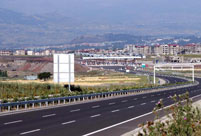 Beautiful Chinese-built roads in Africa
Beautiful Chinese-built roads in Africa Sagya Monastery in Tibet
Sagya Monastery in Tibet
 Young Chinese drive consumption
Young Chinese drive consumption
 The life of a model: Not as glamorous as it seems
The life of a model: Not as glamorous as it seems
 Hello Kitty, happy 40th birthday!
Hello Kitty, happy 40th birthday!
 The Western Qing Mausoleum
The Western Qing Mausoleum
 Avant-garde approach to graduation photos
Avant-garde approach to graduation photos
 Early PLA posters, signatures of an era
Early PLA posters, signatures of an era
 First Russian Street in Tianjin open to public
First Russian Street in Tianjin open to public
 Motorcycle stunt on the Bund
Motorcycle stunt on the Bund
DIEN BIEN PHU, Vietnam, May 7 -- In world history books, the Vietnamese province of Dien Bien Phu, some 300 km northwest of capital Hanoi, is famed for war courage and resiliency.
The Vietnamese Army saw remarkable victory here over the much superior French colonial forces in what is now known as the Battle of Dien Bien Phu in 1954.
After 60 years, Dien Bien has changed from battle field into a prosperous land.
The significant changes of Dien Bien amazed Hua Van Dien, a veteran soldier of the Dien Bien Phu Campaign.
"Sixty years ago, this place was just a hill with everything razed to the ground by bombs and mortars. Now Dien Bien has developed into a very beautiful province," said Dien.
The 83-year-old veteran said he feels very proud and joyful seeing the positive changes that have taken place in the province.
After over 50 days of the Dien Bien Phu Campaign from March 3 to May 7, 1954, Vietnam defeated the French colonial forces, putting an end to their long colonial rule in Indochina.
"The image of Dien Bien province has changed a lot in recent years. The victory of Dien Bien Phu in 1954 contributed greatly to the development of the province," said Hoang Thi Chi, a local resident.
Moving from Thai Binh to Dien Bien Province in 1978, the 70- year-old woman told Xinhua that the economic condition of Dien Bien at that time was very tough.
"Now the economy is developing well and the cultural life is very good, especially during the past 30 years," said the woman.
In May, a series of activities are being held in Dien Bien Phu, capital of Dien Bien Province, to celebrate the 60th anniversary of the victory.
The activities have drawn a lot of veterans and tourists here.
Lo Thi Mon, a 74-year-old woman of Thai ethnic origin, told Xinhua on Tuesday that she does not have much memory about the Dien Bien Phu Campaign since she was only 14 years old at that time.
"The 60th anniversary of Dien Bien Phu victory is something that should be remembered even by the younger generation if only to recognize the sacrifices of our forebears," Mon said.
She has witnessed the fruits of the vision of the late Vietnamese leader Ho Chi Minh.
"We always followed the late leader's words to unite in order to improve living standards," she said.
Do Lenh Coi, 50, also traveled by coach to Dien Bien from his hometown in Ha Nam province, some 60 km south of capital Hanoi, to join the celebration of the Dien Bien Phu victory.
"The meaning of the 60th anniversary of the victory of Dien Bien Phu Campaign is remarkable and immortal," said Coi.
Coi said he visited the monuments in Dien Bien, including the A1 Hill (the final battle to claim the victory of Vietnam at Dien Bien Phu Campaign), the bunker of the French commander and the cemetery of Dien Bien martyrs.
"After the visit, I found that the monuments in Dien Bien have been well-preserved, which will be living proofs to educate the younger Vietnamese generation," Coi said.
He said he was born after the Dien Bien Phu victory and had no chance to take part into the glorious fight of his forefathers against foreign invaders.
"However, following their path, I joined the army to serve the country. We, the veteran, vow to play as a good example for the younger generations to follow,"Coi said.
After he retired from the army, Coi has worked at the education department of Ha Nam province.
"As a teacher, I will teach my students about the heroic tradition of our ancestors and never to forget their sacrifices, including the victory of Dien Bien Phu Campaign," Coi said.
 When we are young...
When we are young... Solar halo occurs in Lhasa
Solar halo occurs in Lhasa Photos give cheongsam a new life
Photos give cheongsam a new life Graduates bid farewell to campus in clown costume
Graduates bid farewell to campus in clown costume Badain Jaran Desert: Amazing curves of nature
Badain Jaran Desert: Amazing curves of nature Beautiful Chinese-built roads in Africa
Beautiful Chinese-built roads in Africa High fashion trend welcomed by costumers in Changsha
High fashion trend welcomed by costumers in Changsha About 100 cubs expected to be born in NE China's Siberian Tiger Garden
About 100 cubs expected to be born in NE China's Siberian Tiger Garden China wins 19th women's team title at table tennis worlds
China wins 19th women's team title at table tennis worlds The 'Chinese Dad'
The 'Chinese Dad' Chinese mountaineer's gear list
Chinese mountaineer's gear list  Newly recruited police in Hetian hold drill
Newly recruited police in Hetian hold drill  China's most luminous celebrities
China's most luminous celebrities Top 10 most expensive cars in the world
Top 10 most expensive cars in the world 'African Street' in Guangzhou
'African Street' in GuangzhouDay|Week|Month